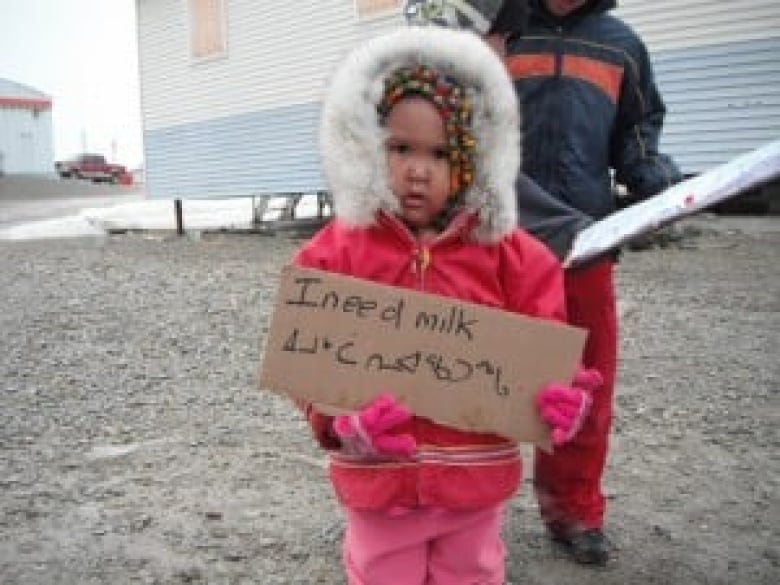Solving Nunavut's food insecurity will need local input
People who want to help should listen to Northerners and get informed about the issues

Because I live in the North, I’ve been getting questions from my friends in southern Canada about what they can do to help improve the food insecurity problem in Nunavut.
It’s been heart-warming to follow the response to news coverage of the problem, especially initiatives like the Helping Our Northern Neighbours Facebook group, which ships care packages North. But the folks involved with the group themselves recognize that this is only a temporary solution.
- Want more opinion? Visit our CBC North's Opinion page
What else can the rest of Canada do? There is no simple answer, and I often struggle to come up with one for my friends who ask. However, there are a few things that would be a start in the right direction.
The best thing we can do is to listen to Northerners themselves. They understand their problems, and they also have ideas on how to deal with it.
I spent the afternoon having tea with a well-known Inuit elder in our community.
"Some change is good and some change is bad," she told me.
"In the old days, we would live out on the land and just lived on basic needs, eating caribou, fish, and seal. Now that we live in communities built by the government, we have to pay for rent and power, which we never did on the land. Now people need money, and now we have a different diet, not a very healthy one. Now there’s alcohol and drugs.
"It’s a different way of life than our ancestors lived, and living up north is so expensive now."
She talks about how families here live from pay cheque to pay cheque, even the more fortunate families with two incomes. The happiest days are paydays, when everyone knows they are going to eat that day.
I ask her what she thinks needs to be done. She thinks that in some ways, we need to go back to the traditional ways. She recalls how happy people are when they can go out on the land to go fishing and hunting. As a practical solution, she agrees that we need to increase support for hunters.
"We need to get more funding to the hunters and trappers organizations so they can get more food out on the land," she suggests.
"Give hunters a full time job hunting. All these unemployed people in town can go out on the land hunting, getting healing and refreshed."
Then they could come back to town with food to share with the community, and they would feel good about themselves.
Get informed
What can our southern neighbours do to help improve the food insecurity problem in Nunavut?
The first step is to become properly informed. Look at the roots of poverty in Nunavut. There are complex, often interrelated social issues, including housing shortages, a lack of support resources, isolation, and colonialism.
Understanding the issues means understanding the cultural history of Nunavut as well. Learn about how the Inuit lived for centuries, and how these living patterns shifted with contact with European explorers and later as the Canadian government increased its presence in the north.

Learn about what Nunavummiut face now. There are no Wal-Marts or Loblaws here, so sending big box gift cards is not helpful. Permafrost means that the ground is frozen nearly year round, so one cannot seriously suggest that the Inuit take up outdoor farming. And no, we can’t propose to move everyone in Nunavut down south.
Co-ordinate with Northern groups
We need better strategic co-ordination with local organizations. Many Northern communities already have food banks, wellness centres, homeless shelters, or social workers who know the specific needs in the community. What is lacking is an efficient means of connecting these community players with the resources of southern Canadians who want to help.
Helping Our Northern Neighbours is one strategy at addressing this, but there is so much more that can be done as well. For example, local organizations in the North know how to negotiate with the local stores for deals, or get shipping discounts with Northern airlines. Co-ordinating with these local community organizations would be an effective way of dealing with the challenge of the high shipping costs that confront donors who want to send help.
We also need to ask questions and demand honest answers. Is the Nutrition North food subsidy program working well, and if not, how can we improve it? How can we demand more accountability and transparency of the organizations responsible for the well-being of Nunavummiut?
A long-term solution, however, requires meaningful political change. We have to let our politicians know that the well-being of Nunavummiut is an issue that we deeply care about, especially when we vote.
The current government has already clearly expressed its interest in development in the North; Prime Minister Stephen Harper has toured Nunavut annually for the last nine years, and in our community of Cambridge Bay, they are building a huge Canadian High Arctic Research Station.
We need to let our politicians at all levels know that we also want to see poverty in Nunavut addressed as a higher priority, in order to put pressure on the government to find ways to improve the situation.

